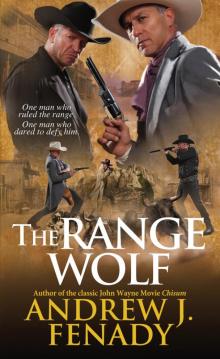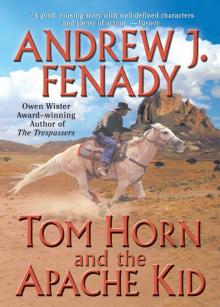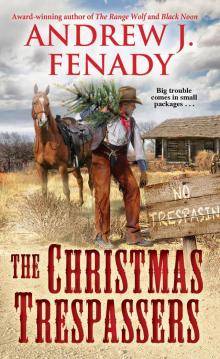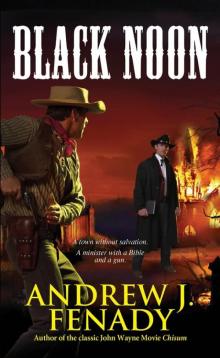- Home
- Andrew J. Fenady
Tom Horn And The Apache Kid Page 3
Tom Horn And The Apache Kid Read online
Page 3
Crook waved at Sheridan. “Phil, you’re a little wide of your mark, aren’t you?”
“George,” Sheridan responded, “you know General Miles.”
Crook nodded. “You’ve not come after Goklaya too, have you, Phil?”
“No, there’s bigger fish to fry,” said Sheridan. “And speaking of fish, which we’re not likely to get out here, how about some supper?”
A million stars pierced the blue-black sky as the men ate and drank coffee around the campfire. General Crook rubbed at his side with his hide-hard hand.
“That Apache arrowhead still troubling you?” Sheridan asked.
“Mostly after I eat. That’s something else I owe Goklaya.”
“Well, George,” said Sheridan, lighting a cigar, “you’re not going to pay him back.”
“Meaning what?” Crook frowned.
“It means I’m ordering you up to the Platte again.”
“When?”
“Tomorrow morning.”
“But Goklaya—” Crook started to protest.
“Goklaya is one bad Indian,” Sheridan interrupted, “with less than a hundred followers. The Dakotas are swarming with six thousand Cheyenne and Sioux.”
“The Cheyenne and the Sioux are at peace.”
“They were when you left.” Sheridan watched the smoke of his cigar as it blended and vanished into the dark sky. “But they’re painted again. And doing something called a ghost dance…following a ‘messiah’ they call Wovoka.”
“I know Wovoka,” Crook said quietly.
“And you know Sitting Bull,” Sheridan said, “and Big Foot, Kicking Bear, and all the rest of the Oglala and Hunkpapa chiefs. That’s why you’re going north. General Miles is taking over your command.”
“He’s going after Goklaya?” Crook did not look at Miles, who sat stiffly nearby.
Miles answered for Sheridan. “Not personally. Captain Crane will lead the expedition. I’m going on to Fort Bowie.”
Crook looked hard at his friend General Philip Sheridan.
“Phil, with all due respect to the captain, he’s going to be up against—”
“Oh, come on now, General,” Miles interrupted. “I believe that the myth of the red man’s superiority over the white race has been greatly exaggerated. I don’t believe the red man is superior physically and certainly not mentally; that his fiber, sinew, and nerve power is of a finer quality; that his lungs are of greater development and capacity to endure the exertion of climbing these mountains than those of our own men like Captain Crane.”
“Maybe,” said Crook, “but General, there’s only been two animals to scale and survive on those Mexican ridges—the mountain sheep and the Apache. Phil”—Crook tossed a pebble into the campfire—“after all this time can’t you wait—”
“I can wait, George.” Sheridan spoke with the calm authority of the seasoned soldier he was. “But I’m not at all sure about those six thousand painted Indians. Are you?”
It was a question that didn’t need answering. Crook flung out the dregs of his coffee and walked toward his scouts, who had heard the conversation. As Horn and the Kid watched, Sieber produced his canteen and poured some fluid into Crook’s cup.
“I’ve learned one thing after twenty years of being in the United Stares Army,” said Crook. “It’s pointless to argue with the United States Army.”
“Army’s right, this time, General,” said Horn.
“You brought in Custer’s killer,” Sieber added. “Made peace in the Black Hills.”
“Gray Wolf’s big medicine up there,” the Kid added.
There was a moment of silence, broken only by the crackling sound of the campfire and a coyote wailing in the desert, waiting for an answer that never came. Then Horn spoke softly.
“We’ll get your panther for you, General.”
“Watch out that panther doesn’t claw our young captain.” Crook motioned his cup toward Crane.
“He’ll learn,” said Horn.
“Some learn.” Sieber poured drinks into the scouts’ cups. “Some die.”
“They’ll die if they listen to that overstuffed book soldier,” Horn added.
“General Miles has waged a lot of successful campaigns,” Crook said.
“Not against Apaches,” Sieber snorted.
“Can’t buy Apaches like he bought his commission,” Horn grinned. “His best strategy was when he married General Sherman’s niece.”
“She’s a fine lady,” Crook responded, “and I want you men to promise to help him. That’s my final order. Will you do that?”
The three scouts nodded.
“I’ve got a feeling,” said Crook, “that this is our last drink together. I want to thank you men.…I...”
“Enough said, General.” Sieber raised his cup. “It’s a creation-big country, but trails cross. We’ll have another drink together somewhere, sometime.”
Crook lifted the cup to his lips. “In heaven or hell,” he said.
“I hope it’s someplace in between.” Horn smiled, and the four friends drank.
Chapter Four
April is the crown jewel of the desert. In April, the desert glitters with variegated plants, flowers, and aspiring life. Bright, shimmering cholla cactus, golden crocus, pink verbania, and flaming-red ocotillo blooms; quail, rabbit, and wild turkey scamper among their squads of young. April is the time of rebirth, with spring rain bathing newborn birds and chasing the winds of winter while washing the ferns and fondling grass. April is a time of seedling hope, of budding promise when things begin to bloom and move across the desert. And early that April morning the soldiers, scouts, and animals moved and then diverged: Crook, Bourke, and Sheridan to the north; Miles to the northeast; Horn, Crane, and their expedition to the south, toward the border and Goklaya.
With every mile the terrain became more rugged and wild. Captain Crane rode next to Horn.
“Beautiful country,” said Crane.
“It is, but don’t trust it.”
“I don’t see any signs of Indians.”
“Yeah, well, when you see Apache signs be careful. When you don’t see ’em, be more careful.”
“Mr. Horn, I had a little talk with General Crook last night. He has the highest regard for you and Mr. Sieber and…” Crane pointed toward the Kid.
“He’s called the Apache Kid.”
“Mr. Horn, about these Indians…”
“What about them?”
“They fight their own people....”
“Crook’s strategy,” said Horn. “Use Apaches to chase Apaches.”
“I presume he got the idea from the British—use colonials to fight colonials.”
“I presume.” Horn nodded.
“Why do they choose to fight on our side?”
“Maybe they want peace.” Horn shrugged. “Or maybe they want pay.”
Horn was in no mood for trail talk. He could have further educated the young captain on the subject but chose to break off the conversation. Horn’s eyes, mind, and senses stayed with the task ahead, with the hunt and the killing that would come if they found Goklaya—or if Goklaya found them. In this kind of warfare, the element of surprise was infinitely more important than manpower or firepower. Usually whoever hit first won.
Call it surprise, sneak, or ambush—that first unexpected attack meant victory. And it was up to the scouts to provide that element. Crook used few white scouts against the Apaches; most of his scouting contingent were Apaches.
Why did Apache fight Apache? Pay? Peace? Yes, and more. Long before the white man sought out and settled Arizona, there was deadly rivalry among the tribes even as there had been among the ancient Greek city-states. One tribe raided another, not just for territory and certainly not for crops— these people were hunters, not farmers. There was an unending need for one tribe to prove its superiority over another—a restless, irresistible drive to swoop and raid, steal horses and women, and claim victory over a worthy enemy.
Now, for years,
the older chiefs and warriors, pent up and moribund on torpid reservations, had been boasting and taunting the younger bucks with tales of past glory.
It was no wonder that when Crook gave these young natural hunters and warriors an opportunity to leave the placid confines of the reservation and reap a new glory, they leaped at the chance. He hired rival tribes to chase the renegades and payed them well in money and in what the Apaches loved most of all—adventure. Besides, in this way the young Apache bucks could claim revenge for bloody raids the renegades had often made on the defenseless reservations.
Horn and Crane rode in silence until a question occurred to the captain. “Mr. Horn, in an encounter, how can we tell our Indians apart from the hostiles?”
“You’ll notice,” Horn pointed, “all our Indians wear a scarlet headband.”
“The Apache Kid doesn’t.”
“He’s different,” Horn said in a hard voice. “There’s another way of telling.”
“How’s that?”
“In an encounter, Captain, the hostiles’ll be trying to kill you. There’s the border.”
Late that afternoon the lowering sun threw long shadows from the sawtooth peaks of the Sierra Madres. Beige sand stretched toward the blue-black rock that tore into the hot, clinging sky. The expedition was miles into Mexico, past the no-hurry río into wind-whipped canyons, moving toward the mountains that belonged to God and the eagles.
One of Sieber’s Indian scouts rode up fast. Sieber, Horn, and the Kid reined in. So did Crane, as the Indian’s winded horse snorted and plopped to a standstill. The scout spoke in Apache.
“What is it?” Crane asked.
“Apaches,” said Sieber. “Hit a ranch about two miles west.”
“Well, let’s go,” Crane responded eagerly.
“Save your animal, Captain,” said Horn. “It’s too late to do those people any good.”
It was.
When Horn and the others arrived, the burned-out ranch was still smoldering. The contingent dismounted and found at least eight bodies, so horribly mutilated that Captain Crane vomited.
The Apache Kid approached, carrying an empty whiskey bottle.
“American?” Sieber asked, pointing to the label.
The Kid nodded and handed the bottle to Sieber. Horn surveyed the devastation. “Took the cattle and the women. May as well bury what’s left of the rest.”
The Kid motioned toward the retching young officer. “Something he ate?”
Crane wiped his palm across his mouth and breathed heavily. “I…I’ve seen men killed before, but never anything as savage as this.”
“Dead is dead.” Sieber spat.
“Bad for them,” said the Kid, pointing toward the hacked-up bodies, “but good for us.”
“What does he mean?” Crane asked Horn.
“He means—now we’ve got tracks to follow.”
Chapter Five
The column moved deeper into Mexico. Sieber rode ahead. The Apache Kid was nowhere in sight. Neither were the other Indian scouts. Crane kept his horse paced next to Horn’s buckskin. Suddenly, in the heat of the desert, Captain Crane’s body shuddered as if he were suffering a severe chill.
“What’s wrong, Captain?” Horn asked.
“I can’t get the sight of those mutilated bodies out of my mind.”
“Apaches don’t like Mexicans.”
“They have a grisly way of showing it.”
“Yep,” said Horn. “Every chance they get. Always been that way.”
“Why?”
“Quién sabe? Maybe because a long time ago the Apaches started raiding the villages, so the Mexicans started offering rewards for Apache scalps.”
“Money?”
“Pesos. A hundred pesos for a male Apache scalp, fifty for a woman’s, twenty-five for a child’s—male or female. No questions asked.”
“Is this still going on?”
“Yep. Bad blood, and old Goklaya’s got a couple of reasons in particular.”
“What reasons?”
“Some years back the Rurales raided a Chiricahua camp and massacred some warriors and women, including Goklaya’s mother and his brand-new bride—girl named Alope.”
“Mr. Horn, you seem to know all about Indians.”
“Nobody knows all about Indians.” Horn pointed toward Al Sieber. “Sieber comes closest.”
“I don’t think your chief of scouts likes me.”
“Why say that?”
“He hasn’t said three words to me in three days.”
“He’s got nothing to say.”
They rode for another hour before Crane spoke again. “I thought you said we had tracks to follow.”
Horn nodded.
“I don’t see any tracks, Mr. Horn.”
“The outriders do.”
“What do you mean?”
“I mean you can’t follow Apaches’ tracks directly, Captain. If you do they’re liable to double back and ’bush you. Got to do it panther style.”
“Panther style?”
“Yeah. We’re going parallel to ’em. Cross once a day, then travel parallel on the other side.”
“That’s why we’ve been zigzagging?”
“That’s why. They’ve already split up. Main bunch took the cattle. There’s five of them kept the women. Probably played for ’em.”
“What do you mean, ‘played’?”
“Gambled,” said Horn. “Apaches like a game called monte. And even if they don’t like Mexicans, they’ll mate with the women and produce sons who’ll kill more Mexicans.”
Just then the Apache Kid galloped out of a ravine toward them. He pulled his horse up to Sieber, as Horn and Crane also approached.
“They’ll never be in a better spot for us,” the Kid beamed.
“John Six-Killer!” Sieber hollered. “He Dog! Hump!”
Three Apache scouts joined up with Sieber. Sieber waved and rode off. The Indian scouts followed. So did the Apache Kid.
“Captain,” Horn said to Crane, “you stay here with the troopers till you hear gunfire. Then ride toward it.”
Horn galloped away.
“But…” Crane looked around and exclaimed to no one in particular, “What the hell is going on!”
Chapter Six
At the makeshift camp there were five nearly naked Apache broncos and three completely naked Mexican captive women.
Two of the women were heavy and across their broad backs and thick legs were bloody lines where the Indians had taken switches to their bodies to urge them along on the trek. The youngest girl was thin and wide-eyed, with long, straight black hair that fell to her small, upturned breasts. She was unmarked except for those breasts, which had been pinched and twisted and cruelly abused by one of the Apaches as she rode in front of him astride his horse.
The Indians laughed, drank, and played monte. In the pot were rosaries, clothes, and other effects of the stripped and frightened women, who hunkered nearby, ignored for the moment.
Horn, Sieber, the Kid, and the other scouts silently crawled into vantage spots around the camp.
At a signal from Sieber, he and the scouts opened a deadly crossfire with their Winchesters. Two Apaches dropped instantly, dead. The third managed about four steps, then stopped with a neat hole between his eyes and the back of his head blown away. The fourth made it a little farther— just a little, but with the same result.
The fifth and final Apache ran like a burning cat toward an opening between two boulders. As he passed through he was greeted rudely by the stock of Horn’s rifle, swung by the barrel. The rifle butt smashed the Apache’s flat face even flatter.
“You killed them!” Captain Crane cried out when he arrived and surveyed the carnage. “Butchered them all.”
“All but one, Captain,” said Sieber. “He’s gonna take us to Goklaya.”
“Better see to the women, Captain,” Horn added. “This ain’t gonna be pretty.”
It wasn’t.
The surviving Apache,
his face battered, was tied upside-down to a tree. Already several razor cuts had been sliced across his belly and breast. Blood seaped down his chest, across the cartilage that had been his nose, into his eyes, and off his long black hair onto the ground.
The Apache Kid had done the carving as Sieber and Horn watched. Sieber spat and nodded again. The Kid’s knife blade gently stroked across the Apache’s chest again, producing another fine red line.
“Reluctant, ain’t he?” Horn said to Sieber as Captain Crane strode over.
“Mr. Sieber,” Crane fumed, “I can’t allow this....”
Sieber paid no attention.
“No, you can’t, Captain,” Horn said evenly. “So why don’t you take a walk? Won’t be long now.”
“It won’t be long before this man bleeds to death.”
“You want to find Goklaya?” Horn asked.
“Of course I do,” the young officer replied. “But...”
“There’s no worse death for an Apache,” Horn said, “than to be strung upside-down and bleed to death.”
The Apache Kid picked up a handful of blood-soaked dirt and let it filter through his fingers.
“His spirit’s doomed to wander down below, Captain,” said the Kid, “instead of up there in the heavenly hunting grounds.”
“He’ll tell,” Horn added.
Sieber nodded, and the Kid started to slice again. At the touch of the blade the Apache screamed a ghostly scream that echoed through the dark canyons. The Kid smiled and relaxed.
“You see, Captain,” Horn said pleasantly.
Later, Tom Horn gave the Mexican women food and talked to them in Spanish. They were shrouded in army blankets and clung to their rosaries. Captain Crane stood nearby.
“Gracias, señor,” said the oldest woman.
“Por nada, señora,” Horn replied, then walked away as Crane followed.
“Poor, miserable creatures,” Crane intoned. “What kind of a life will they go back to?”

 The Range Wolf
The Range Wolf Tom Horn And The Apache Kid
Tom Horn And The Apache Kid The Christmas Trespassers
The Christmas Trespassers Black Noon
Black Noon